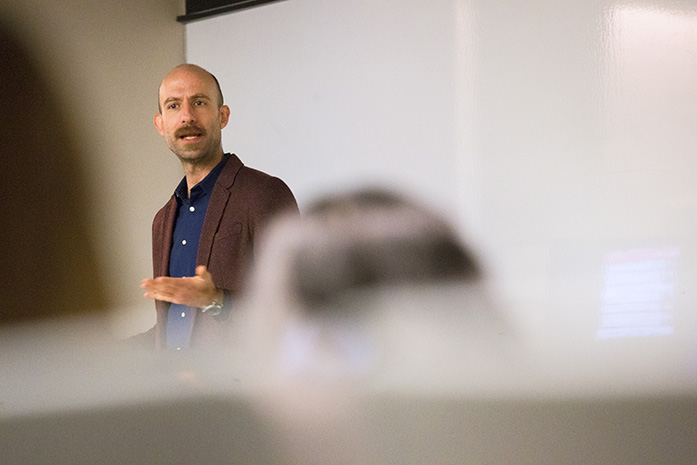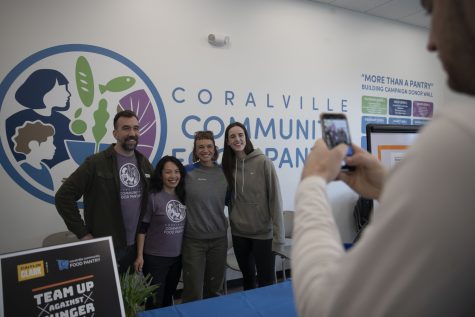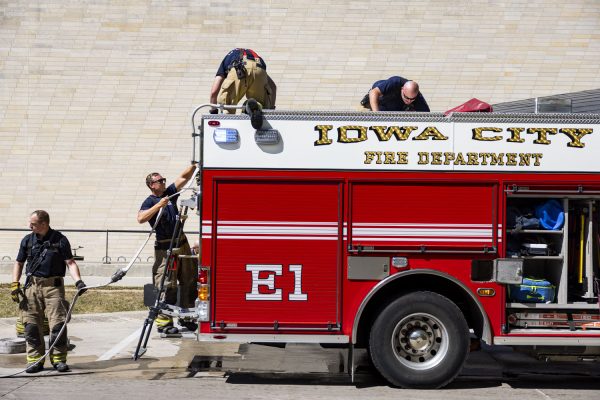Panel focuses on stigma regarding HIV/AIDS
HIV specialists come together to begin the 2016 IC Red Week events by forming a panel to discuss HIV/AIDS.
November 30, 2016
Although the HIV/AIDS outbreak hit the United States hardest around the 1980s, those working with the disease in Iowa emphasize the importance of opening dialogue about it. The disease led to the deaths of 1.1 million people nationwide in 2015, according to the American Foundation for AIDS Research.
The IC Red Week Committee, which started at the University of Iowa in 2008 to promote HIV/AIDS awareness among the UI community, hosted a “Social & Medical Breakthroughs in HIV/AIDS” panel Tuesday night in the Pappajohn Business Building to kick off the Red Week events.
Panel members discussed how societal perspectives on the disease have shifted over time as new medical advancements have been made, affecting the treatment of the disease and the stigma associated with it.
Patricia Young, the HIV Prevention program manager at the Iowa Department of Public Health, said approximately 20 percent of people in Iowa who have HIV are unaware they live with the virus. Working with clinicians and physicians to check for HIV a more routinized part of health care is a key step to preventing and treating HIV, she said.
In addition to destigmatizing the disease by normalizing its place in health-care and medical treatment, extending kindness to those living with the infection is important, said Dena Dillon, an HIV specialist in the UI College of Pharmacy.
“This is an infection that a lot of people stigmatize,” Dillon said, while describing some of the efforts people with HIV take to keep their infection hidden from those close to them, such as keeping medicine locked away in a cabinet. “Showing that little bit of care and compassion really goes a long way.”
One person’s acceptance of the infection came to be a great comfort for Cecil Baldwin, the narrator of “Welcome to Night Vale,” a podcast that is popular among the LGBTQ community.
Baldwin went to a tattoo parlor in New York about a year after being diagnosed with HIV and was initially concerned his infection would prevent him from being able to get a tattoo. Instead, the tattoo artist said it was not a problem and that his sister also lived with HIV.
“For the first time, someone had treated this as if it was not a big deal,” he said. “It was something that needed to be noted, but it was not a life-changing event.”
Over time, Baldwin became empowered to speak up about living with HIV to open the dialogue surrounding the infection, especially after the shooting at Pulse Night Club in Orlando, Florida. He said his success with “Night Vale” was like an “extra-large, superpowered megaphone” he could use to raise awareness.
“I could let it sit there on the shelf and not rock the boat, just let life be life and talk about business stuff … or I could use this megaphone to amplify the voices of people that need it the most,” he said.
While the panel members acknowledged major strides have been made in regards to HIV treatment, especially as a result of the Affordable Care Act, they expressed concerns over how recent progress could be undone under President-elect Donald Trump.
Letting politicians know how the policies they enact affect the lives of real people will be key to protecting access to HIV treatment.
“They have to hear personal stories of how this will affect our community,” Young said. “We have to stand up and say, ‘This is what this will mean for us.’ ”
Real stories will likely prove to be more effective in influencing lawmakers than informing them of the statistics, Baldwin said.
“It’s really easy to ignore numbers, but it’s really hard to ignore people,” he said.















